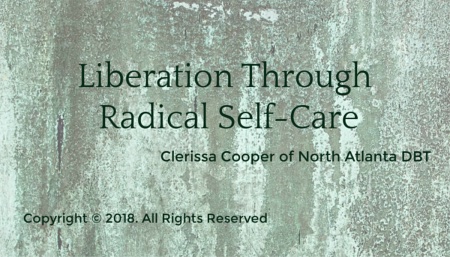Giving, Pleasing and Perfectionism
Yesterday I spoke with at least 5 people in various capacities of my work and life who are unhappy based on a very common triad:
- Giving too much;
- People pleasing; and
- Perfectionism
These states of being are hazardous to our health and well-being. In order to stop feeling overwhelmed, stressed and as if others are taking you for granted or taking advantage of you; you must revisit your relationship to the aforementioned habits and reverse them.
On Giving Too Much!
Stop giving so much! This is how you will stop feeling overwhelmed and stressed out. This is how to change the perception you have that people are taking advantage of you, or the idea that people are not appreciating you.
This idea may be counter to what you have been taught…that “it is better to give than to receive.”
The truth is…it is just as important and valuable to receive as it is to give.
The truth is…if you do not allow yourself to receive, whether it be rest, or support from others, or even gifts, etc…you will find your reserves running on empty. In fact, you may not have energy reserves at all.
Many people prefer to give because it is a very empowering feeling to give to others. Often others are grateful…you get the sense that you are doing something of great value and that you are making a difference. Giving is good.
Where giving can go wrong is when you are doing more than what is asked, needed or necessary and when this is your “go to” way of interacting with others. When you give more than what is asked, it is often connected to a sense of a larger return expected by you (the giver). Perhaps you are seeking to be liked, approved of, rewarded, understood, appreciated, validated…maybe you want to feel invaluable…or you want to feel that you matter.
This could be happening in your professional or personal relationships.
- You see a need and you fulfill it.
- You hear a request and you provide.
- Someone asks for volunteers and you raise your hand…and so on.
I am not saying that “giving” in and of itself is bad. Giving is important. It is vital to relationships and to community and to teamwork. Giving can also be a way to hide from one’s own vulnerability, particularly when the giver is depleted by their over-giving and when they avoid the vulnerability and the necessity of receiving.
To receive is to say “I need or I want”, or at least to reveal that one has expectations and/or requirements for the relationship to be mutually satisfying. To assert one’s needs, wants or requirements is to risk great reward…but also possible conflict, which can lead to the parting of ways from a job or a relationship.
To identify with what one “needs or wants” means that if our needs/wants are not fulfilled, we can feel let down, hurt or – in some cases – we could be without vital resources that we need for our lives (emotional safety, physical resources, financial resources and self respect).
Stop Trying to Please Everyone
Often people will be pleased and happy with you and other times they will not be at all. Still, in most cases people do not even notice or pay attention to you or what you are doing because they are engrossed in their own experiences.
Somehow many of us (human beings) have gotten the idea that we “must” be pleasing to all. The idea that someone disapproves of us or misperceives our sincere and wonderful intentions is challenging. I am not suggesting that you adopt difficult ways of being or that you purposely seek to push others away.
Neither should you be myopic and ignore the likes or dislikes of others. What I am suggesting is that you really pay close attention to which people you are giving special consideration toward and ask yourself, “Why?”
Do you have a “real” relationship to that person or an imagined one? Have you projected meaning into your professional or personal relationship with them? Perhaps you have a “real” work, social or family relationship, but despite your best efforts…you continue to feel hurt and undervalued by that person.
Sometimes we do that (project intent) to fill in the gaps…the unknowns. We assign meaning…typically the meaning we assign to someone else’s behavior is based on what we think it would mean if we engaged in that behavior…the behavior we are experiencing of someone else.
We imagine that maybe they don’t like us?
Don’t see us?
Don’t appreciate us?
Don’t know us well enough?
We begin to think that if we just did X, Y, or Z…they would be pleased, acknowledging and appreciative. Instead, we should seek to practice and engage from a place of personal integrity so that we are pleasing to ourselves. It is not an affront to like yourself, to feel good about you and to try to maintain that.
As long as you are not making sure you are happy and pleased at the expense of others. (By this I mean if you are only pleased by hurting others…you have no right to that). As long as you are not causing harm or blurring healthy boundaries with others…do what pleases you. If any of this resonates for you at all…chances are you recognize that for too long, you have made someone else’s comfort a measuring stick for your own.
Nobody’s Perfect!
Too often I hear people proclaiming perfectionism as a point of pride. I can tell you that while I admire the organization and the timeliness of people who strive for perfection, I don’t strive for those traits at the risk of my own sanity. Some self-proclaimed perfectionists have impossible standards for themselves and others…I’ve seen the pain this causes to all concerned.
Their expectations skew toward unrealistic. Many of their interactions with others have an implied criticism: “Look what a mess that person is…it is outrageous.” Some of the helpfulness that perfectionists exude is a need to take something over so it can go their way (the right way).
When I’ve supported a perfectionist toward completing their goal…they are often still unfulfilled because they struggle to savor the moment….sometimes due to lamenting something that could have gone better.
Perfectionists can bring out discomfort in others. Perfectionism is a cloak for anxiety…others pick up on that anxiety. Their fears can be debilitating. My hope for perfectionists is that they can learn to think “I know this isn’t perfect…I’m not perfect…but I did the best with what I had.”
For me, the difference between doing one’s best and striving for perfection is that doing one’s best has implied limits. If I am doing the best with what I have in terms of time, resources, skills, abilities, characteristics and talent…you will find flaws. In fact, those flaws are part of the personality and character of the “thing.”
As we enter this holiday season and approach a new year…as part of the grand cycle of change…let’s embrace failure!
Let’s let someone down, let’s not overdo, let’s do our best…which is far less than perfect! Let’s extend these true gifts to others…that they are not perfect, not always pleasing, and that sometimes they are selfish. Let’s know that we can still give and receive respect (and in some cases love) as well as self acceptance and acceptance of others…when we release the desire to control every outcome.
In the words of the great singer/songwriter Carly Simon “You don’t have to prove to me that you’re beautiful to strangers…I’ve got loving eyes of my own.” You don’t have to do it all, be pleasing, or be perfect to be valued and to be respected…it all starts with treating yourself with respect.





